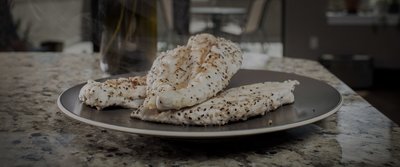When it comes to workout goals, generally speaking, gaining muscle mass is slightly less precise than trying to lose fat.
With fat loss, there are a variety of factors to take into consideration - how long you've been on a diet, how large of a deficit you should be using, how you need to construct a workout to ensure your body is able to recover effectively, given your limited fuel reserves, and so on. Couple that with the fact that as calories come down, you'll deal with psychological factors such as food cravings, troubles concentrating (when hunger begins to get intense), and pressure to move off your diet by those around you.
Mass-Building Diet
Mass-building, on the other hand, is a little more straightforward. Ensure you are getting enough protein, ensure you are placing a large enough stimulus on the body to overload the muscles, and be sure you're not doing too much volume that you just spin your wheels and get nowhere. Then, if you aren't gaining, you just need to keep adding more food until you are.
Obviously tracking calories to some degree is generally a smart approach since the body can only assimilate so much muscle tissue in any given time span, with the additional being added as fat, but this does not need to be calculated quite as precisely as it would if you were on a fat loss plan.
That said, there are some factors you can definitely take into consideration that may help improve your mass-building progress since they will maximize exactly what your body needs at any given time.
Below are the main points to keep in mind. By making an effort to choose certain types of food at certain times of the day, you can be sure all your needs are being met.
For calculation purposes, we're going to use a 170 pound male. If you weigh more or less, you will adjust your numbers accordingly.
Calories
First, figure out how many calories you will need to start with on your quest for gaining muscle mass. An easy way to estimate this will be multiplying your total body weight in pounds by 15-17 calories.
So, our 170 pound male would be shooting for a daily calorie intake of 2550 - 2890. Then, if you find you are not gaining any weight at an appreciable rate after a couple of weeks, bump this up by about 10% more.
Of these calories, you should be aiming for at least one gram of protein per pound of body weight (170 grams for our example). You can bring this up to 1.5-2 if you wish, but going any higher isn't really all that beneficial. The body will just end up breaking down this excess protein, excreting some of it, and then either using the other calories for energy or storing them as body fat.
How you then choose to divide the remaining calories between carbohydrates and fat is really up to you. If you tend to feel tired, sluggish, bloated, and so on after a very carb heavy meal, you'll likely do better on a higher fat approach.
On the flip side, if you find you feel great and energized after a high carb meal, then you'll likely want to go a high carb route instead.
As a guideline though, when bulking, aim for at least 100 grams of carbs per day (in addition to ones to support training) to stay out of ketosis (which can make it harder to add muscle), and go no lower than 15% fat as this is what's essential to keep hormonal functions running properly and keep testosterone levels where they should be.
So, let's say you're going to do about a 30-30-40 ratio, in terms of protein, carbs, and fat. This would equate to about 190 grams protein, 190 grams carbs, and 115 grams fat, for a total of 2550 calories.
Meals
Now, when it comes to choosing how many meals you'll eat, this can be largely variable. If you are someone who does better eating quite frequently, break this into 4-6 meals a day, in addition to your pre/post workout meal.
If, on the other hand, you find that worrying about getting all of your meals in causes you a lot of stress, aim instead to have three meals a day, along with the pre-/post-workout meals.
The old notion that you need to eat every 2-3 hours is just not correct. Your body is not going to start catabolizing muscle if it goes three hours and one minute without food; this is especially true when you are already in a calorie surplus.
The only reason why it might be more beneficial to consume more meals per day is because if you are a male who has to eat a very large volume of calories in order to see any weight gaining happening, trying to get so many calories in at once can pose a bit of a challenge at times.
Now, when it comes to the constituents of those meals, this is what you should pay attention to:
Morning
Protein
During the morning, you'll want to get some fast acting protein into the body, so you can quickly get protein to the muscle cells after the overnight fast. For this reason, consider a breakfast that contains eggs, white fish, or some type of protein powder isolate blended with a shake. These will all be broken down by the body quickly, entering the blood stream as rapidly as possible.
Carbohydrates
In terms of carbs and fat, your carbohydrate intake can be a mix of simple and complex. The simple carbs will help provide a small insulin spike, which then helps the amino acids further get to that muscle tissue sooner. On the other side, the complex carbohydrates you choose to eat during this period will help provide a lasting source of energy.
So, examples of this could be juice with some oatmeal, a couple pieces of fruit with a bowl of whole-wheat cereal, or a bagel with some low-sugar yogurt.
Fats
Finally, some healthy fat should be consumed in this period to both help get those calories up. Natural peanut butter generally works the easiest for the morning meal since it goes well with break-fast types of foods, but if you'd prefer another source, feel free to add it in (nuts are another example).
Afternoon
Now, moving to the afternoon hours, here you want to also keep your protein intake up, along with providing the body with slower burning sources of carbohydrates. This will help to ensure that the muscles are getting nutrients over the entire day to promote anabolism and prevent the accumulation of fat that can be seen when large insulin spikes are created.
Good options for daytime meals would include chicken breast, fish, salmon, and turkey, along with brown rice, brown pasta, whole wheat breads, or potatoes, veggies, and then a healthy source of fats such as nuts, olive oil, flax seeds, or avocado.
Night-Time Hours
Finally, as you move into the night-time hours, you should be focused on foods that will be the slowest digesting in nature to support muscle growth during the overnight period, when growth hormone is typically at its highest.
You also want to avoid insulin release as well during this period, as that can shunt growth hormone release and cause you to wake up midnight with feelings of hunger. Aim for a good, solid source of protein, along with a large dose of healthy fat. Carbohydrates, generally (and assuming you are not performing late-night workouts) should be kept to minimal amounts.
Typical examples of food choices here would be a lean piece of steak, other cuts of lean red meat, or cottage cheese (due to its casein content), along with more peanut butter, nuts, or any types of seeds.
Pre/Post Workout
The last consideration that must be mentioned is the pre-/post-workout period. The foods eaten during this time should always remain relatively constant regardless of your goal (calorie intake will vary, however). You want to be consuming both protein and carbohydrates during each meal, with limited amounts of fats.
Fat will slow down the release of nutrients into the bloodstream and cause more blood to move to the digestive organs to work on digestion. This could lead to you feeling sluggish in the gym and not being able to workout optimally.
The carbohydrates should be quick digesting immediately post-workout to create an insulin spike and get them into the muscles as quickly as possible to get muscle glycogen re-synthesis started. After that, follow them up with a slower digesting source about an hour later (along with more protein).
Pre-workout carb choices will be a little more variable. If you're working out first thing in the morning, you'll want something a little quicker digesting to give you energy for the workout, while if you're working out in the afternoon and have been eating throughout the day, this is of decreased importance and they could just be the usual slower digesting carbs you consume at your meals.
Conclusion
So, if bulking is your main focus right now, keep these factors in mind. While total calories are going to be the deciding factor whether or not you are successful in packing on the muscle, optimizing these calories to what your body needs at various points in the day can definitely help further your success along once that calorie surplus has been created.


